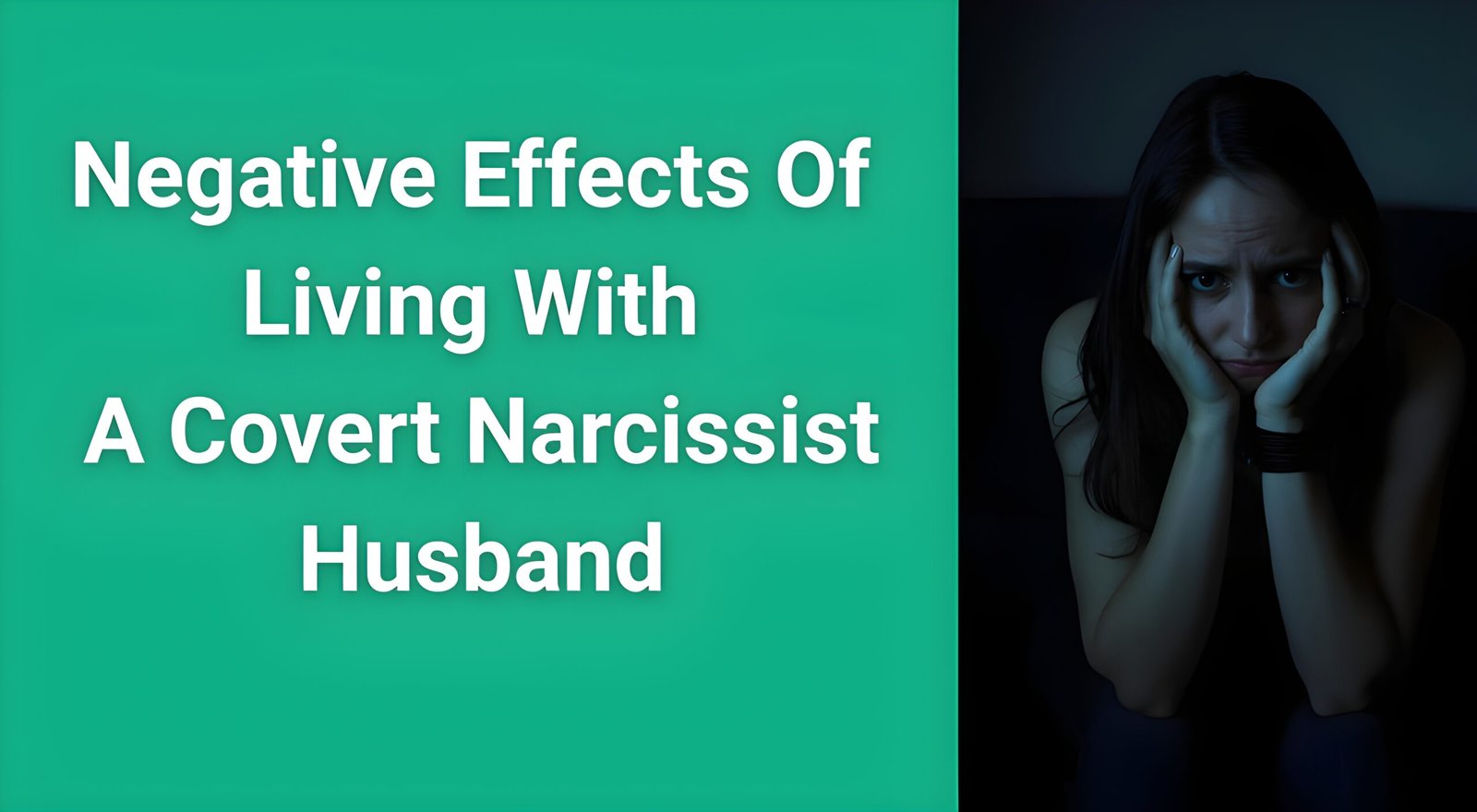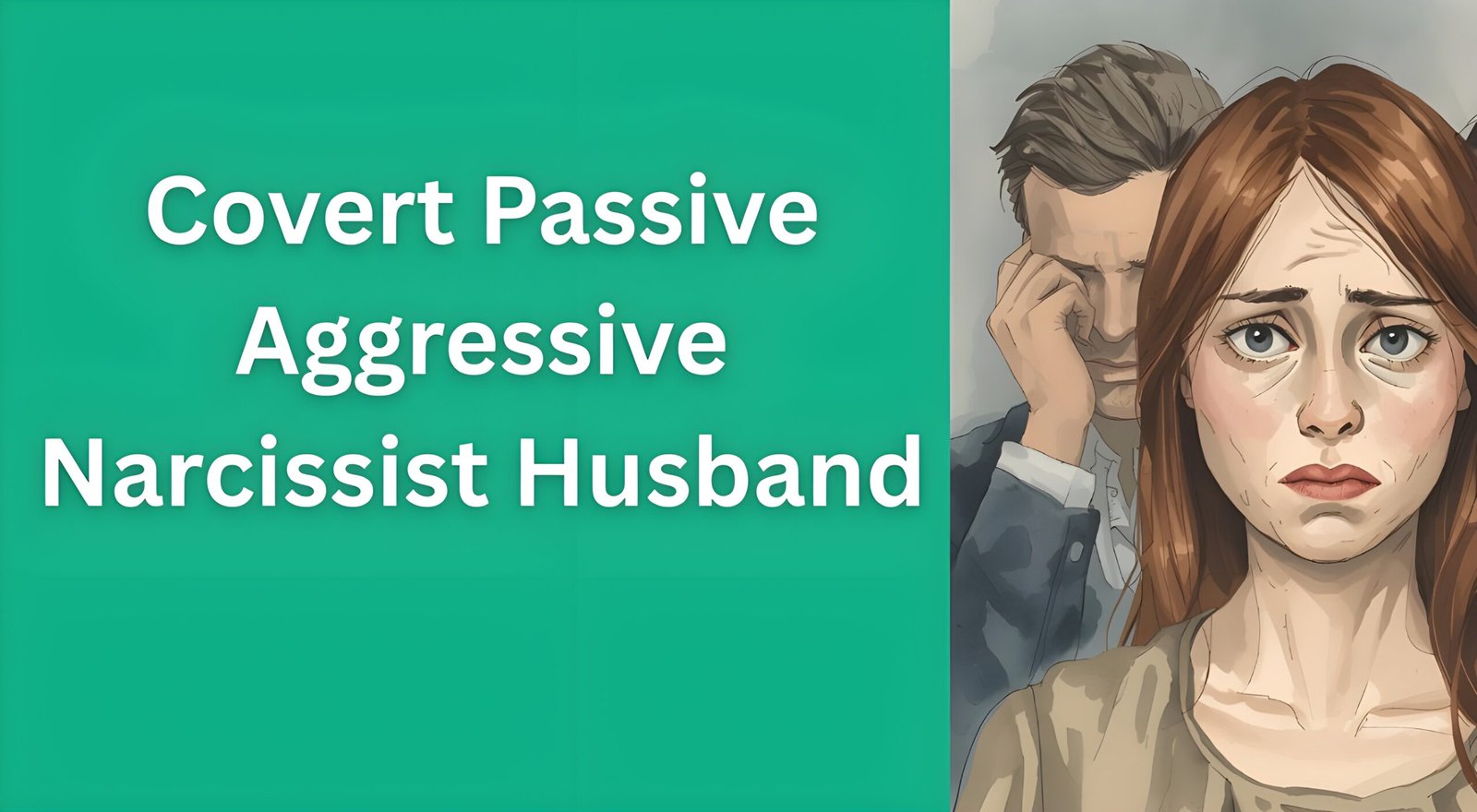If you’re questioning your sanity, walking on eggshells daily, and wondering why you feel completely drained in your marriage, you might be experiencing the devastating negative effects of living with a covert narcissist husband. These negative effects of living with a covert narcissist husband are often invisible to outsiders, making validation and support incredibly difficult to find. Unlike their overtly grandiose counterparts, covert narcissists operate in shadows, making their psychological abuse incredibly difficult to identify and even harder to explain to others.
The term “covert narcissist husband” describes men who display narcissistic personality traits through subtle manipulation, passive-aggressive behavior, and emotional withdrawal rather than obvious grandiosity. These hidden narcissistic patterns create a unique form of psychological torment that leaves wives confused, isolated, and often questioning their own reality.
Research indicates that living with a covert narcissist creates cumulative trauma that affects every aspect of your life – from your mental health to your physical wellbeing, social relationships, and sense of self. Understanding these negative effects of living with a covert narcissist husband is crucial for validation and recovery. The effects are real, they’re devastating, and most importantly, they’re not your fault.
Understanding Covert Narcissistic Abuse
Before exploring the specific effects, it’s crucial to understand what makes covert narcissistic abuse so insidious. Unlike overt narcissists who clearly display their need for admiration and superiority, covert narcissists hide behind a mask of sensitivity, victimhood, and introversion. They manipulate through subtle tactics that are designed to confuse and control while maintaining plausible deniability.
Dr. Craig Malkin, a clinical psychologist specializing in narcissism, explains that covert narcissists “possess the same core features as their overt counterparts – grandiosity, entitlement, and lack of empathy – but express these traits through passive-aggressive and manipulative behaviors rather than open aggression.”
This hidden nature of their abuse creates a perfect storm for psychological damage. You know something is wrong, but you can’t quite put your finger on what it is. This ambiguity becomes a weapon that covert narcissists use to maintain control while avoiding accountability.
The 12 Devastating Negative Effects of Living With a Covert Narcissist Husband
1. Chronic Self-Doubt and Reality Questioning
The most immediate effect of living with a covert narcissist husband is the erosion of your ability to trust your own perceptions. Through subtle gaslighting techniques, he consistently makes you question your memories, feelings, and interpretations of events.
This isn’t the dramatic gaslighting you might see in movies. Instead, it’s comments like “You’re being too sensitive,” “That’s not what happened,” or “You always remember things wrong.” Over time, these seemingly minor contradictions accumulate into a profound loss of confidence in your own reality.
Dr. Ramani Durvasula, a leading expert on narcissistic abuse, notes that “chronic gaslighting creates a state of learned helplessness where victims become dependent on their abuser to define reality.” This psychological dependency becomes one of the strongest chains keeping you trapped in the relationship.
The constant reality-checking creates mental exhaustion. You find yourself recording conversations, taking screenshots, or desperately seeking validation from others about basic facts. This hypervigilance is your mind’s attempt to protect you, but it comes at an enormous psychological cost.
2. Emotional Numbness and Disconnection
Living in a state of chronic stress and confusion leads to emotional shutdown. Many women married to covert narcissists describe feeling like they’re living behind glass – present but not really there. This emotional numbing is actually a protective mechanism your mind employs when overwhelmed by constant psychological threat.
The covert narcissist’s pattern of emotional withdrawal and intermittent reinforcement creates what psychologists call “trauma bonding.” You become addicted to the rare moments of warmth and connection, while your emotional system shuts down to protect you from the constant disappointment and rejection.
This emotional disconnection doesn’t just affect your marriage. You may find yourself unable to fully engage with your children, friends, or activities you once enjoyed. The emotional energy required to navigate your husband’s unpredictable moods leaves little room for genuine joy or connection elsewhere.
3. Chronic Anxiety and Hypervigilance
The unpredictable nature of a covert narcissist’s behavior creates a state of constant alertness. You’re always scanning for mood changes, potential triggers, or signs of impending emotional punishment. This hypervigilance is exhausting and creates chronic anxiety that affects every area of your life.
Your nervous system remains in a state of fight-or-flight, even during seemingly peaceful moments. This biological stress response was designed for short-term physical threats, not the chronic psychological threat of living with someone who uses emotional manipulation as a control mechanism.
Research shows that chronic exposure to this type of stress can lead to anxiety disorders, panic attacks, and even post-traumatic stress symptoms. Many women report feeling anxious even when their husband isn’t home, as their nervous system has learned to anticipate potential threats.
4. Physical Health Deterioration – Hidden Medical Consequences
The negative effects of living with a covert narcissist husband extend far beyond emotional damage into serious physical health complications. The stress of living with a covert narcissist husband doesn’t just affect your mind – it takes a severe toll on your physical health. Chronic stress hormones like cortisol suppress immune function, disrupt sleep patterns, and contribute to various health problems that doctors often struggle to diagnose properly.
Common physical symptoms include:
- Chronic fatigue despite adequate rest
- Frequent headaches and muscle tension
- Digestive issues and loss of appetite
- Autoimmune flare-ups
- Sleep disturbances and insomnia
- Unexplained aches and pains
Many women find themselves making frequent doctor visits with mysterious symptoms that have no clear medical cause. Healthcare providers may suggest stress as a factor, but without understanding the specific nature of narcissistic abuse, they can’t address the root cause.
The body keeps score of psychological trauma, and living with a covert narcissist creates the perfect conditions for stress-related illness. Your physical symptoms are real and valid, even if medical tests don’t reveal obvious abnormalities.
5. Social Isolation and Relationship Damage
Covert narcissists are masters at slowly isolating their partners from support systems. This isolation doesn’t happen through obvious controlling behavior. Instead, they use subtle manipulation to damage your relationships and make you dependent on them for social connection.
They might make passive-aggressive comments about your friends, create “emergencies” during your social plans, or subtly criticize people who care about you. Over time, you begin to withdraw from others to avoid conflict or because maintaining relationships becomes too emotionally exhausting.
The isolation is compounded by the difficulty of explaining what’s happening in your marriage. Covert narcissists often appear charming and helpful to outsiders, making it nearly impossible to gain support or validation from others. Friends and family may see you as the problem, especially if you try to express concerns about your husband’s behavior.
This social isolation serves multiple purposes for the covert narcissist: it reduces your access to reality-checking and support while increasing your dependence on them for emotional and social needs.
6. Loss of Personal Identity – The Most Devastating Long-term Impact
Perhaps one of the most devastating negative effects of living with a covert narcissist husband is the gradual erosion of your sense of self. This identity destruction represents one of the most profound negative effects of living with a covert narcissist husband because it affects your ability to make decisions, set boundaries, and maintain relationships long after the abuse ends. Through a process called “identity erosion,” your individual thoughts, preferences, and goals slowly disappear as you adapt to your husband’s ever-changing expectations and moods.
This identity loss happens gradually. You might start by changing small preferences to avoid conflict, then find yourself adopting his opinions to prevent emotional punishment. Eventually, you may struggle to remember who you were before the relationship or what you actually want from life.
The covert narcissist’s emotional unavailability forces you to become hypertuned to their needs and emotions while neglecting your own. You become an expert at managing their moods but lose touch with your own emotional landscape.
Recovery often involves rediscovering basic preferences like favorite foods, colors, or activities. The depth of this identity loss is often shocking to women who considered themselves strong and independent before entering the relationship.
7. Financial Stress and Control
Money becomes another tool of control in relationships with covert narcissists. This financial abuse is often subtle and harder to identify than overt economic control, but equally destructive.
Financial control might manifest as:
- “Forgetting” to pay important bills while spending on personal interests
- Making unilateral financial decisions that affect the family
- Undermining your career or work opportunities through passive sabotage
- Using financial stress to create chaos and dependence
- Hiding assets or debts to maintain control
The financial instability created by a covert narcissist adds another layer of stress to an already difficult situation. Even if you recognize the need to leave the relationship, financial constraints may make it feel impossible.
This economic dependency is often intentional, creating a practical barrier to leaving while maintaining the narcissist’s control over household resources and decisions.
8. Parenting Challenges and Children’s Wellbeing
Living with a covert narcissist husband creates unique challenges for parenting and deeply affects children’s emotional development. The inconsistency and emotional manipulation that characterize covert narcissistic behavior create a chaotic home environment that impacts the entire family system.
Children in these homes often experience:
- Confusion about emotional boundaries and healthy relationships
- Anxiety from witnessing parental conflict and emotional volatility
- Parentification, where they feel responsible for managing adult emotions
- Difficulty developing secure attachment patterns
- Modeling of unhealthy relationship dynamics
As a mother trying to protect your children while managing your own trauma, you face an impossible situation. The covert narcissist may undermine your parenting decisions, create division between you and your children, or use the children as pawns in emotional manipulation.
Many women stay in these relationships primarily to protect their children, not realizing that the toxic home environment may be causing more harm than divorce. This creates additional guilt and internal conflict about the right path forward.
9. Spiritual and Existential Crisis
The constant manipulation and reality distortion of living with a covert narcissist often triggers a profound spiritual crisis. Your fundamental beliefs about love, trust, and human nature are systematically challenged and undermined.
Many women describe feeling spiritually bankrupt or questioning their faith after years of emotional manipulation. If you previously believed in the power of love to heal and transform, watching your husband’s inability to connect genuinely despite your best efforts can shatter these core beliefs.
This spiritual damage extends beyond religious faith to encompass your basic trust in human goodness and your ability to discern safe relationships. The betrayal of intimate trust creates wounds that affect how you view the world and your place in it.
Recovery often involves not just healing from the abuse, but reconstructing your entire worldview and belief system about relationships and human nature.
10. Career and Professional Impact – How Home Life Destroys Work Success
The psychological negative effects of living with a covert narcissist husband inevitably spill over into your professional life, creating a devastating cycle that affects your financial independence. The chronic stress, anxiety, and emotional exhaustion that characterize the negative effects of living with a covert narcissist husband make it difficult to perform at your usual capacity, potentially damaging your career prospects and financial independence.
Professional impacts might include:
- Difficulty concentrating or making decisions at work
- Increased sick days due to stress-related symptoms
- Conflicts with colleagues due to heightened sensitivity
- Inability to take professional risks or pursue advancement
- Sabotage from your husband who may feel threatened by your success
Some covert narcissists actively undermine their wife’s career success through subtle sabotage. They might create crises during important work events, make you late for important meetings, or undermine your confidence before crucial presentations.
This professional damage creates a vicious cycle where decreased work performance leads to reduced income and advancement opportunities, increasing your financial dependence on the very person causing the problems.
11. Trauma Bonding and Addiction-Like Attachment – Understanding the Invisible Chains
One of the most confusing negative effects of living with a covert narcissist husband is the development of trauma bonding – an addiction-like attachment to your abuser. This psychological phenomenon represents one of the most misunderstood negative effects of living with a covert narcissist husband because it explains why leaving feels impossible, even when you intellectually understand the relationship is harmful.
Trauma bonding develops through intermittent reinforcement, where periods of emotional withdrawal and punishment are followed by brief moments of connection and kindness. This pattern creates the same neurochemical responses as addiction, making you crave the “highs” of your husband’s positive attention while enduring the “lows” of his emotional abuse.
The biochemical nature of trauma bonding explains why willpower alone isn’t enough to break free from these relationships. Your brain literally believes it needs this person to survive, creating withdrawal-like symptoms when you try to establish distance or boundaries.
Understanding trauma bonding is crucial for recovery because it helps normalize the difficulty of leaving and explains why you might feel “addicted” to someone who treats you poorly. This isn’t a character flaw or weakness – it’s a normal psychological response to an abnormal situation.
12. Complex Post-Traumatic Stress Disorder (C-PTSD)
The culmination of all these effects often results in Complex Post-Traumatic Stress Disorder (C-PTSD), a condition that develops from prolonged exposure to psychological trauma. Unlike PTSD from single traumatic events, C-PTSD develops from chronic trauma in relationships where escape feels impossible.
C-PTSD symptoms include:
- Emotional dysregulation and difficulty managing feelings
- Negative self-concept and chronic shame
- Interpersonal problems and difficulty trusting others
- Dissociation and feeling disconnected from yourself
- Loss of systems of meaning and hope for the future
- Distorted perceptions of your abuser
Many women living with covert narcissist husbands develop C-PTSD without realizing it. The symptoms are often dismissed as depression or anxiety, missing the underlying trauma component that requires specialized treatment approaches.
Recognition of C-PTSD is crucial because it validates the severity of what you’ve experienced while pointing toward effective treatment modalities specifically designed for complex trauma recovery.
The Path Forward: Understanding Your Options After Recognizing the Damage
If you recognize yourself in these effects, the first step is acknowledging that what you’re experiencing is real and valid. The negative effects of living with a covert narcissist husband are not in your imagination, and they’re not your fault. This recognition is often the beginning of healing, even if you’re not ready to make major life changes immediately.
Every situation is unique, and there’s no one-size-fits-all solution. Some women find ways to manage their wellbeing while remaining in the relationship, while others ultimately choose to leave. Whatever path you choose, prioritizing your mental and physical health is crucial when dealing with the ongoing negative effects of living with a covert narcissist husband.
For those seeking clarity about their situation, professional assessment can be invaluable. Understanding exactly what you’re dealing with helps validate your experiences and provides a roadmap for healing. A comprehensive analysis of your specific situation can help you understand why you feel so confused and what steps you can take to protect your wellbeing.
If you’re not ready or able to leave immediately, developing survival strategies becomes crucial. Learning how to maintain your sense of self, establish boundaries, and protect your emotional wellbeing while navigating a difficult relationship requires specific skills and support.
For those recognizing trauma bonding patterns, specialized recovery programs can help break the psychological chains that keep you trapped. Understanding the neurobiological nature of trauma bonding is often the first step toward freedom, followed by structured approaches to rewiring your brain’s attachment patterns.
Conclusion: Your Journey to Healing Begins Now
The negative effects of living with a covert narcissist husband are profound and far-reaching, touching every aspect of your life from your mental health to your physical wellbeing, relationships, and sense of self. These effects are real, they’re serious, and they deserve recognition and proper treatment.
Understanding what you’re experiencing is the first step toward healing. You’re not crazy, you’re not overreacting, and you’re not alone. Thousands of women have walked this path before you and have found ways to reclaim their lives, their identity, and their peace after experiencing the devastating negative effects of living with a covert narcissist husband.
Whether you choose to work within your current relationship or eventually decide to leave, prioritizing your wellbeing is not selfish – it’s necessary. You deserve to live without constantly questioning your reality, walking on eggshells, or sacrificing your mental health for someone else’s comfort.
Recovery is possible. Healing is possible. And most importantly, a life of peace, authenticity, and genuine connection is possible. Your story doesn’t have to end with the effects described in this article. With the right support, understanding, and strategies, you can begin writing a new chapter of your life – one where your reality is validated, your needs matter, and your wellbeing is protected.
The journey may not be easy, but you’re stronger than you know, and you don’t have to walk this path alone. Take it one day at a time, one decision at a time, one boundary at a time. Your healing begins now.






